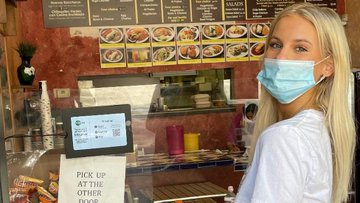
Sara Stewart strolls into a small Mexican restaurant in Los Angeles and orders a torta, a type of sandwich.
To pay she simply looks at her reflection in a small LCD screen attached to the cashier’s counter. Then to add her preferred amount of tip she flashes a quick peace sign at the monitor.
The entire process takes less than five seconds, and is entirely contactless. Moreover, Ms Stewart doesn’t need to carry her mobile phone or bank card with her, or show any form of identification, or even enter a pin number.
Welcome to the futuristic world of facial recognition payment. It might sound like something from a science fiction movie, but this kind of transaction is already happening millions of times a day across China’s major cities.
With the technology now being introduced in the US, and other countries such as Denmark and Nigeria, are we all going to be using it within a few years’ time? And, are there data security and privacy issues that we should worry about?
Ms Stewart, an 18-year-old university student, says she has no such concerns. « I feel like technology is moving so fast that people don’t even think twice about using something like this.
« Our phones already read our faces, and our faces are already all over the internet, so I don’t think it really makes much of a difference [to someone’s security]. It’s faster, more convenient, and safer… and you don’t have to worry about leaving your phone or cards at home. »
She uses facial recognition payment, via a US tech start-up called PopID. You sign up via its website, by uploading a photograph of your face, which is stored on the firm’s cloud-based system. You then link your account to your bank card.
In addition, you can choose to use PopID’s hand gesture tipping tool. Ms Stewart has set this at thumbs up for 10%, the peace sign for 15%, and the shaka or « hang loose » sign for 20%.
PopID is based in Los Angeles, and is now used by about 70 independent restaurants and cafes across a handful of US cities, mainly on the West Coast.
Source : https://www.bbc.com/news/business-55748964
